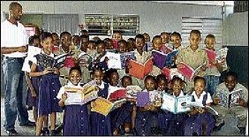Reviewing the GSAT model
Published: Monday | February 23, 2009

Bernard Simpson, grade-four teacher at the Black River Primary School in St Elizabeth, engages his students in literacy skills during a special session at the institution on February 13. - Noel Thompson/Freelance Photographer
A preliminary study by the education ministry has shown that the Grade Six Achievement Test (GSAT), which is now in its 10th year, was not adequately meeting the demands of the nation's changing education sector.
Several suggestions have been made regarding possible changes to the examination.
One suggestion is that GSAT should be based on an age band and not limited to one sitting for the purpose of placement.
There is also a recommendation that strategies be explored to improve placement decisions and provide more equitable access to secondary education.
Here's the ministry's competence-based transition policy:
Primary education is designed to provide for the age-appropriate development of children six to 12 years old. It is at the primary level that the foundation for the acquisition of knowledge, skills, and values for total development and continuing education is laid. Consequently, it is accepted that each child within this age group should be equipped with:
Minimum acceptable literacy and numeracy competencies.
Requisite knowledge, skills and competencies to access secondary education.
Positive values and attitude towards self and others.
In order to raise the literacy rate of the school-age population to desired levels, the ministry will introduce a policy to regulate pupil flow from the primary to the secondary level. This will be a departure from the current practice of pupil flow through the system based on automatic age-grade promotion.
New Policy Direction
No child will be allowed to sit GSAT unless he/she is certified literate.
Measurement of Literacy
The Grade Four Literacy Test administered to children in grade four will function as the standar-dised measure of literacy.
Eligibility for Registration
All children enrolled in grade four of public or registered private schools are eligible to sit the Grade Four Literacy Test.
All eligible children MUST be registered to sit the test.
Birth certificates MUST be presented for registration.
Multiple sittings
Children who master the Grade Four Literacy Test at the first sitting will not be required to repeat the test. Children who did not master the test at the first sitting will have three other opportunities to be certified as literate:
First sitting - general - in June each year (grade four).
Second sitting - supplemental - in December each year (grade five)
Third sitting - general - in June each year (grade five).
Fourth sitting - supplemental - in December each year (grade six).
Literacy Support
International and local research findings indicate that approximately 12-15 per cent of any age cohort will require special provision. To ensure that this proportion is kept at minimum levels, the ministry will:
1. Establish an assessment and referral agency.
2. Introduce a programme to screen children entering grade one to ensure early detection and treatment of children with special needs.
3. Provide targeted interventions designed to improve the perfor-mance of low-performing schools.
4. Engage the services of literacy specialists to supplement the work of classroom teachers.
5. Implement an extensive in-service teacher training programme.
6. Implement a dedicated programme, the Alternative Secondary Education Programme (ASEP), for children who are not certified literate after four attempts at the Grade Four Literacy Test.
Alternative Secondary Education Programme
ASEP will provide a safety net for the children at the end of primary level who will require special support and intervention to advance to the next stage.
Initially, these children will be retained in their primary schools for an additional year
ASEP centres will be attached to existing secondary schools.
A special curriculum will be designed and implemented to cater for the specific needs of this targeted group.
The curriculum will comprise: language arts, mathematics, integrated science, social studies, physical education and wellness, and technical and vocational educational subjects.
Implementation Date
Under this new policy:
1. The first general administration of the Grade Four Literacy Test will be in June 2009.
2. A supplemental sitting will be administered in December 2009.
3. The second general administration will be in June 2010.
4. A supplemental sitting will be in December 2010.
Parental Involvement
Full literacy is a national development goal and in this regard, the ministry will require the support of all stakeholders as it works towards achieving this target. Parents are especially encouraged to keep abreast of their children's progress and devote quality time to reading with their children in order to promote interest in reading at the earliest possible stage of development.















